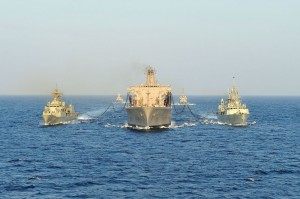Exchange program strengthens bonds
By Lookout on Aug 24, 2015 with Comments 0

Preparation is the key to operational excellence.
Sailors devote countless hours to sharpening their skills in order to maintain readiness throughout the fleet.
As the Royal Canadian Navy (RCN) continues its high pace of operations and prepares to receive the future fleet, it is vital this readiness is maintained through training of its sailors.
Since 2010, over 150 RCN members have participated in the Regulus Program that facilitates exchanges with partner navies from around the world, providing unique training opportunities and exposing sailors to the diverse cultures of many allied navies.
Recently, Petty Officer Second Class Tony Goodwin was sailing with the Royal Navy aboard a Royal Fleet Auxiliary tanker.
With 10 years of experience serving on the recently paid off Protecteur-class supply ships, PO2 Goodwin was assisting in the development of replenishment at sea (RAS) training opportunities for RCN sailors.
“I was identifying training opportunities for Royal Canadian Navy sailors onboard the Royal Fleet Auxiliary to help prepare our navy to receive the joint support ships and to help strengthen the already excellent ties we have with the Royal Navy,” said PO2 Goodwin.
While sharpening sailor’s skills, the Regulus program is also helping to strengthen relationships with allied nations, increasing interoperability and reinforcing the navy’s commitment to international peace and security.
“This growing interoperability is vital to sustaining a relevant, world-class navy,” said Lieutenant (Navy) Arthur Halpenny, Regulus Personnel Coordinator.
“The Royal Canadian Navy is now more agile and capable to operate with partner navies, as the program not only builds relationships at the candidate level, but at the staff level as well.”
Canada is currently one of 10 countries participating in the program, which includes Australia, Chile, France, Ireland, New Zealand, Peru, Portugal, the United Kingdom and the United States.
Originally implemented as a way to get more RCN sailors to sea during a period of reduced sailing opportunities as a result of the Halifax-Class Modernization/Frigate Life Extension program, Regulus is now shifting focus.
The resounding success of the program has shown its potential to address current capability challenges in order to ensure the RCN maintains operational excellence both at home and abroad.
“From the onset, Regulus was established to cover the Halifax-Class modernization period,” explained Lt(N) Halpenny.
“However, as the RCN continues to enjoy the direct, secondary and tertiary benefits of this program, including enhanced interoperability with naval partners, it is quite likely that it will be continued under a new mandate.”
This new mandate will allow the RCN to maintain and develop expertise in areas such as Arctic navigation and RAS. A renewed Regulus program will make sure the RCN is ready to meet evolving missions with the future fleet.
As the program evolves, new potential partners have emerged in the navies of Denmark, the Netherlands, Norway and Spain.
Members have also deployed to work with non-traditional naval partners including the Japanese Maritime Self-Defense Force and the navies of India and Singapore.
Training opportunities have included ice navigation, off-shore patrolling and icebreaker engineering.
Through exchanges with partner navies from around the world, Regulus will continue to employ RCN sailors abroad to maintain their training, development, qualifications and at-sea experience during a period of major, ongoing modernization and procurement within the fleet.
Katelyn Moores
MARPAC PA Office
Filed Under: Top Stories
About the Author:





